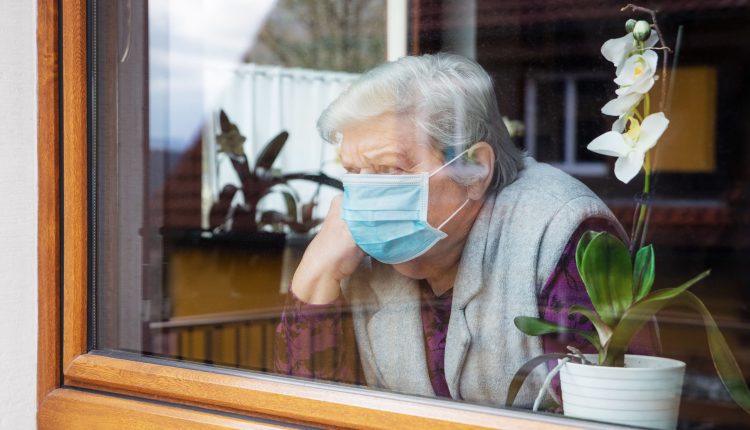
How Does COVID-19 Influence the Lives of Seniors?
The world has witnessed a pandemic disease. That has influenced the whole nation, and this disease has affected various demographic groups differently. The sick and elderly are the most vulnerable groups to this disease. The pandemic has changed the elderly’s routines and the care and support they are receiving. They have to spend most of their time at home. And the pandemic has also influenced their physical contact with their family members, friends, and colleagues. Furthermore, the fear of illness and death of their own and their family members inflicts mental pressures on them.
Hence, governments and officials need to create opportunities to help vulnerable groups experience healthy aging during the COVID-19 pandemic. This article will focus on how the novel COVID-19 pandemic affects seniors’ lives.
As stated by various healthcare officials, COVID-19 disease threatens those with preexisting health conditions. This disease’s impact occurs when the person suffers from preexisting health conditions for older adults. Various conditions such as diabetes, respiratory problems, and cardiovascular issues are common among older adults, raising the likelihood of severe COVID-19 and COVID-19-related death. Since the elderly have a weaker immune system than the younger generations, recovery and fighting the infection are considerably lower. The statistics published by the World Health Organization (WHO) show that since April 2020, more than 95% of the deaths related to COVID-19 were among people who were older than 60.
Contents
Senior Nursing Homes and the Crisis of COVID-19
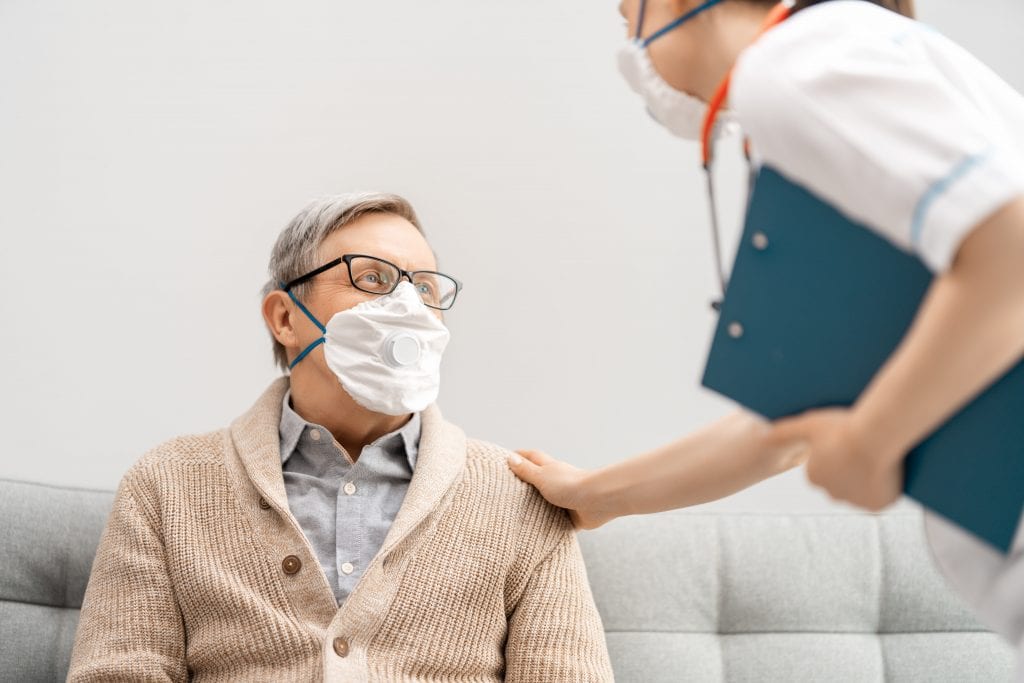
Despite various governmental efforts to suppress the virus’s spread, some places act as the epicentre of COVID-19, and nursing homes and hospitals for seniors are among such sites. The danger is that the spread of coronavirus in these places puts the elderly at risk, but it can also have various life-threatening impacts on healthcare workers. This threat multiplies because more than 70% of the cases infected with coronavirus do not show any symptoms and act as silent vectors.
Seniors with Dementia and COVID-19
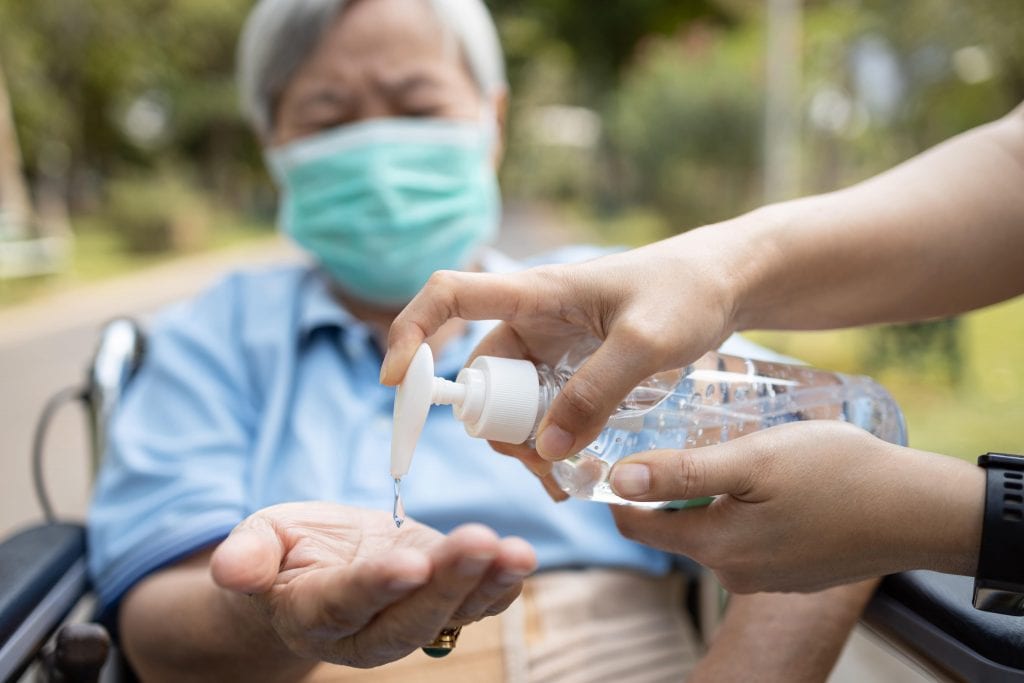
Dementia and Alzheimer’s disease are among the conditions which impact the elderly more than the other age groups. It might be difficult for seniors with dementia to understand better the potential dangers of COVID-19, which makes it impossible to follow safety precautions to protect themselves from the virus. The other difficulty which worsens the condition is the contraction of those who care for the elderly. Since they cannot leave the elderly independently, they cannot receive any therapeutic intervention, leading to fatal consequences.
The pandemic also has considerable psychosocial influences on different age groups, among coronavirus’s most common psychosocial impacts, anxiety, adjustment disorders, fear, stress, depression, and insomnia.
The elderly are among the most vulnerable groups to these conditions. The governments have suggested social isolation and social distancing as the primary strategies to prevent the infection spread. Social distancing is impossible for the elderly since it can worsen the sense of loneliness.
The younger generations can overcome the feeling of loneliness during social isolation and distance via different media, and they can amuse themselves with smartphones and various social media. That is not the case with the elderly because most of them are not comfortable with media or intelligent devices, which increases the sense of solitariness and limits their knowledge about the pandemic. Due to their lack of familiarity with media, language, family, or caregivers should explain the epidemic’s precautions using simple terms. For more information about avoiding Loneliness, Please read this article here.
Mental Health of Seniors During COVID-19 Pandemic and Quarantine
As noted earlier, social isolation can cause mental health problems like anxiety and depression. Physical distancing can increase cognitive impairment, worsen panic, and increase the difficulty of heeding the elderly’s precautions. Also, older adults suffering from mental health issues can show exacerbation symptoms during the crisis. However, WHO emphasizes the importance of the seniors in healthcare priority during the pandemic. The discrimination and lack of availability of health care facilities are among the factors leading to poor healthcare during COVID-19. Overloading their information about COVID-19 can cause paranoia and distrust of healthcare. That might have some consequences, like avoiding being quarantined. The panic hurts the individuals mentally, but it can also increase the spread of the coronavirus. We need to increase the sensitivity of early recognition of healthcare requirements and find the best solutions for the senior people during the pandemic.
Some steps are vital to be followed during the epidemic to keep both the elderly and ourselves safe. In some cases, the children leave far from their elderly parents or go to their offices and leave their parents alone at home.
One of the most important things you can do is keep them happy during the pandemic by calling them frequently by video calls to create security and happiness.
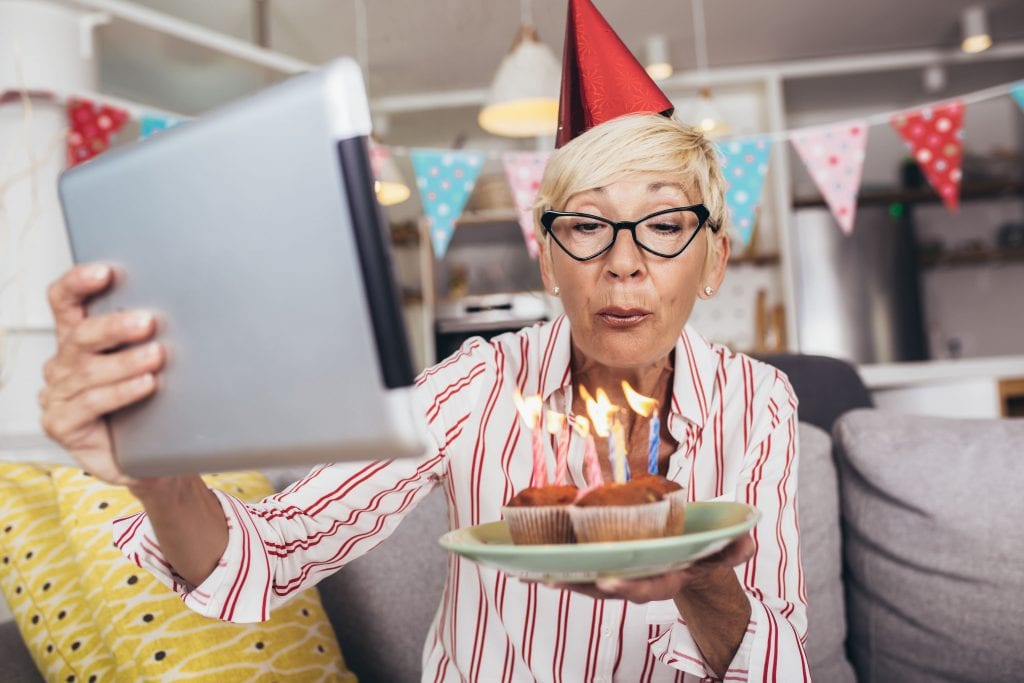
Some seniors are taking medicines, and it is essential to have their medication delivered to them online to restrict them from going out.
Various online drugstores and shops can cater to your door’s required medicine and groceries.
Medical Treatment During Pandemic
As the seniors are most vulnerable to the impacts of coronavirus and the doctor’s offices are prone to be infected with this virus. It is good to contact the doctors remotely and receive their consultations. You should also have the phone numbers of local care services and clinics in case of any emergency. When it is necessary to take them to the hospital or a healthcare center, ensure using a mask and paying attention to the protocols.
In dealing with the elderly, it is always necessary to be ready for emergencies. You should keep their medicine available all the time. In some cases, not taking the medication increases the risk of low immune system functioning, paving the way to being infected with the coronavirus. It is also advisable to check their blood sugar and pressure regularly.
Although the drugstores are essential services and have kept the activity during the pandemic, it is advised to stock the required medicine for a few weeks. That reduces the need to go out and ensures that they have their prescription for the next few weeks, reducing their stress.
Stay Away from Social Media and News
Another point to help the elderly during the pandemic is to limit their access to the news or media. Since social media and TV cover the statistics and recent information about the COVID-19, they can make Seniors worried about their lives. Ensure the older adult takes a break from following the news and social media. Instead, you can spend some time with them and do the activities they are interested in.
Foods and dietary supplements are another essential consideration for the elderly during the pandemic. Ensure they receive a well-balanced diet and provide them with vitamin C supplements to increase their immune system’s power. Hydration shouldn’t be forgotten during the pandemic, and refrain from getting a dry throat.
More Resources: The Role of Music in the Health of Seniors
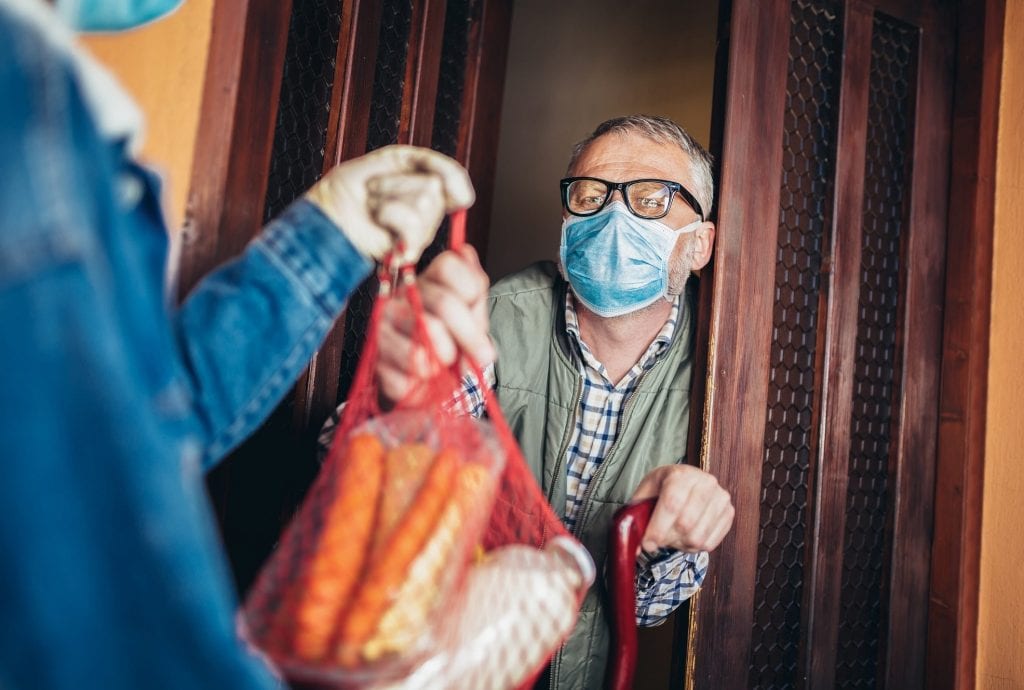
Conclusion
We all wish to have a life without any threat from the epidemic. But we have to take care of the seniors who have dedicated their youth to us a demanding period. Taking the above considerations into account can help us to reduce the possibility of infection. The elderly are vulnerable not only to health issues but also to the psychosocial impacts of the pandemic.
Our responsibility is to provide a happy environment to live a stress-free life during these hardships. It is good to follow the World Health Organization’s (WHO) suggestions for caring for seniors during the pandemic, paying attention to their medical and psychological needs. That will enable us to respect their dignity and personal space and are the most critical components of the elderly’s mental health care of the elderly.
More Resources:
I can remember how scared I was at the beginning of the pandemic. I really thought it was the end of the world. The worst thing is that I have high blood pressure. Thanks to technology these days, I was able to keep in touch with my son and my daughter-in-law. I also got some DVDs to practice yoga at home. They have helped me a lot.
Dear Gertrude, you are not alone. I guess we all felt the same initially because we just heard frightening news about the death rate around the world, but knowledge is power. Now that after nearly two years we have more info about this disease and how it spreads, we can better protect ourselves and at the same time have some safe time with our dear ones esp in open spaces.
It is absolutely very important to take good care of seniors’ physical and mental health during the pandemic since they are more vulnerable to the virus. We are worried about them and hope we can get over these days soon so we can all feel the joy of life again.
I agree with you, Molly. I am in my thirties, and I do not feel comfortable going out much now to put my family and loved ones at risk. Older adults have insufficient social support during the pandemic and are more vulnerable. Humans are social creatures. I have been self-isolating for a year now because all my friends are older than I am. Stop treating older people like children. If anyone deserves care and respect, it should be seniors. Well done to those people that are protecting seniors.
When the pandemic occurred, I felt that it is undoubtedly a short-term situation and could be fixed throughout a couple of weeks. However, at this moment, it has gone more than one year, and it’s not fixed yet. I’m sure the pandemic changes all peoples’ lives. But I think it has a more destructive effect on seniors. The only happy moments in people’s (like us) lives are when we meet our grandchildren or hanging out with old friends. But now? thanks to coronavirus, I can’t remember the last one socialized. I’m really frustrated.
I remembered 7 months ago, I was deal with Covid-19, it was a sad time because I felt my lungs couldn’t exhale, and all of the things are terrible. Thanks to new remedies and good doctors, I passed those days, and now I am excellent.
Unfortunately, I have seen the worst days of my life since the pandemic. I’m so sad and alone. I think the Covid-19 has become a good excuse for my children to avoid visiting me. They constantly tell me it is unsafe to see me because they go to work, and there is a possibility of being transmitters. I can’t bear this loneliness, and I need to see my family in person. What should I do?
My dad lives in an independent living retirement community. He is confined to his apartment.
He felt isolated and nervous, and he was scared for his life. He couldn’t go to his regular doctor’s visits, and the nature of his visits didn’t allow for a full visit via facetime even if he had that technology. He has mild dementia.
I was amazed at how many of the seniors in his community thought that the virus was a hoax. They didn’t believe anyone was dying from it and said it was all a political ploy.
One of the things that worries me the most is the possibility of neurodegeneration or hippocampus atrophy revealed by some of the cognitive impacts, and what that would mean in the long run. Dementia is a bad outcome by itself, but accelerated pathology or increases in early-onset would be disastrous for survivors and their families.
I miss my grandchildren. Before this goddamn disease, they visited me every weekend, but now I just video call them. This new variant, omicron, we’re sitting home again.
Making sure that the elderly are aware of the danger that COIVD poses towards them can be a tricky job as well. My mother and I have been living with my grandmother for a while now, and taking care of her, especially with the Omicron variant outbreak, has been a stressful task. My grandma is always worried about her health and never misses a doctor’s appointment. Unfortunately, she doesn’t seem to care much about the COVID situation, primarily because she has received three vaccine shots.
It’s like every time we try to explain to her about the new variants of COVID and how dangerous they are, even for those who are vaccinated, she refuses to listen. Thankfully, we do most of her shopping and outdoor work, but whenever someone comes to her house without a mask, she refuses to wear one as well.
I think the pandemic was not challenging for anyone more than seniors. First of all, the risk of the disease is dangerously higher for seniors, and it makes them more isolated than other younger adults, and they can’t be in touch with their family members. Second, seniors are not as familiar as us with mobile applications and social media. So it was a bit tricky for them to learn how to use them to see their family and friend online.
I understand it was such a big challenge, and we should be proud of our parents and grandparents that could handle it.
I’m 64 years old, and I have chronically bad lungs (not from smoking, but bad pneumonia 40+ years ago). My two younger children, both in college, live at home with me. If they bring this illness home, I’ve told them it’ll be the last disease I’ll ever catch.
This annoying Virus is quite destructive to lung tissue, and many elderly have developed chronic respiratory ailments, which reduce the lung’s capacity to put up a fight. Of course, anyone younger with such conditions (like Asthma) will also have problems but might have a slightly better chance of overcoming the Virus.